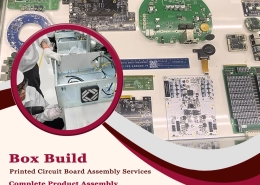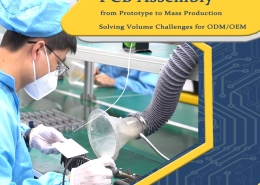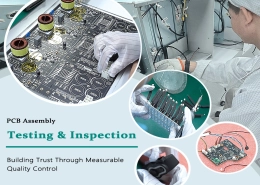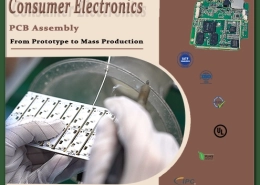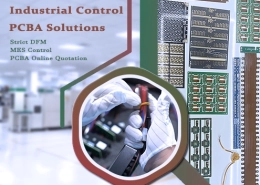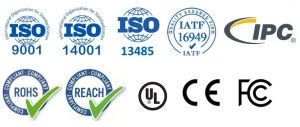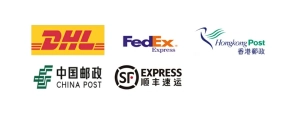The Future of PCBA Manufacturing: 2025 Trends in AI Quoting, Automation, and Global Integration
With the deep penetration of 5G and high-tech, traditional PCB board production lines can no longer meet the needs of high-density integration and flexible production. The demand for high-performance, cost-effective and fast-turnaround electronic products continues to surge. Printed circuit board assembly manufacturers are rethinking smart manufacturing: from AI-driven quotation systems to machine vision-supported SMT assembly lines, from data-centric process control to strategic cross-border factory layouts, the PCBA industry is entering an era of efficiency and intelligence integration.
1. AI-Powered Quoting Platforms: From Manual Estimation to Intelligent Precision
The traditional PCB and PCBA quotation process is often time-consuming and labor-intensive, prone to human error, resulting in low efficiency, large errors, and slow response times. Engineers must manually evaluate bill of materials (BOMs), calculate materials, and predict lead times.
Three major bottlenecks of manual quotation processing:
- BOM costing lags: Market fluctuations significantly affect component prices, and manual updates can take up to 3-5 days, easily leading to distorted quotes.
- Circuit board manufacturing process complexity assessment is subjective: Processing fees for specialized processes (such as BGA packaging and high-frequency PCB boards) rely on empirical judgment, with an error rate of up to 20%.
- Hidden costs are uncontrollable: Indirect costs such as line changeover losses and testing time for small-volume orders are difficult to quantify.
Core technology of intelligent quotation
The intelligent quotation system—integrating modules such as PCB quotation, PCBA quotation, BOM service, and box build quotation—has revolutionized the industry’s cost estimation and production scheduling methods. Through data-driven and algorithmic optimization, it has achieved a leap from “fuzzy estimation” to “precise prediction.”
- Dynamic BOM Database
-
- Integrates global component price indices with real-time data from authorized distributors and manufacturers. When shortages or price fluctuations occur (such as out-of-stock of key ICs), the system triggers AI-driven substitution recommendations, offering equivalent components that meet electrical and functional specifications.
- Tiered pricing optimization automatically selects the most cost-effective sourcing strategy based on order quantity, supplier location, and lead time, helping reduce procurement costs and avoid production delays.
- Intelligent PCB and PCBA Quoting
- The PCB and PCBA Quoting module combines AI algorithms with manufacturing process data to quickly generate accurate cost estimates.
- PCB Quoting: The system evaluates design parameters (such as PCB layer count, copper thickness, board material, surface finish, and impedance requirements) to predict manufacturing difficulty and calculate baseline costs instantly.
- PCBA Quoting: It cross-references BOM data with assembly parameters such as component density, SMT complexity, reflow profile, and testing requirements to provide quotes in a fraction of the time.
- PCB Fabrication Production Simulation and Predictive Analysis
- Process Flow Simulation: Verifies SMT stencil designs, reflow profiles, and AOI inspection routes.
- Yield Prediction: Leverages historical process data and AI learning models to estimate yield based on component type and PCB design.
- Cost Risk Mapping: Highlights cost-sensitive areas (such as fine-pitch BGAs or high-frequency substrates) to recommend Design for Manufacturability (DFM) improvements.
- ERP/MES System Integration
-
- ERP integration: Connects procurement, inventory, and financial modules, synchronizing material availability and real-time pricing. This ensures quotes are financially accurate and aligned with corporate resource planning.
- MES integration: Directly connects factory equipment data, production plans, and quality feedback loops. This enables the quote system to reflect actual production conditions, machine utilization, and operator efficiency.
- Combining ERP and MES integration transforms the quote system into a closed-loop intelligent platform where quotes, production, and delivery continuously optimize each other.
SCSPCBA Circuit Board Practical Case
As part of its digital transformation, SCSPCBA has developed an AI-driven intelligent quotation system that quickly provides accurate quotes for PCBs, PCBAs, and box-build assemblies. This platform supports global component sourcing, rapid estimation of product prototype material costs, and BOM optimization, ensuring every customer receives accurate, fast, and transparent cost assessments.
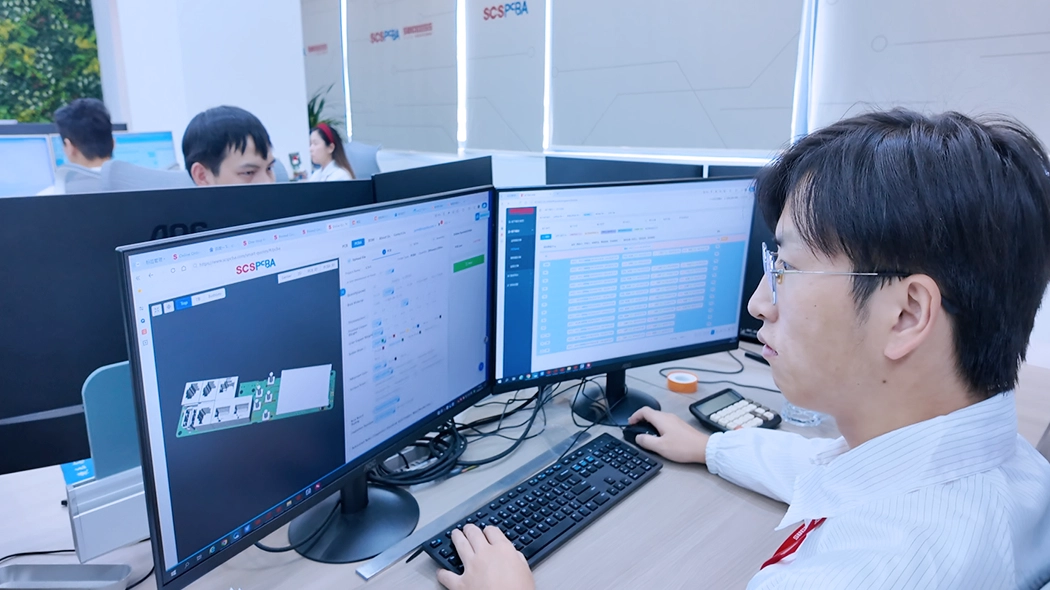
2. The Collaborative Advancement of SMT Automation and Machine Vision
In the PCB manufacturing assembly industry, SMT (surface mount technology) automation has always been the cornerstone of efficiency. From early fully automatic placement machines to today’s intelligent production SMT lines, automated equipment has improved placement accuracy to ±0.025mm, capable of completing 200,000 component placements per hour and reducing labor costs by over 70%. However, with the prevalence of miniaturized components (such as 01005 packages) and unusually shaped devices (such as CSP chips), traditional automation faces bottlenecks in identification and quality control.
The rise of machine vision has injected new momentum into surface mount technology process:
- High-precision positioning: 3D vision systems can identify pad offsets as small as 0.1mm², guiding placement machines to achieve micron-level compensation.
- Automated Optical Inspection (AOI): Real-time imaging systems can detect minute solder defects and misalignment with a near-zero error rate. Real-time Defect
- Detection: A deep learning algorithm can identify defects such as solder bridges and cold solder joints within 0.5 seconds, with an error rate of less than 0.3%.
- Closed-Loop Feedback Control: Data from inspection equipment is directly fed back to the printer and reflow oven for automatic parameter adjustment.
- Flexible Production Adaptation: Visual recognition of PCBs of varying specifications enables rapid changeovers on the PCB fabrication production line.
The SCSPCBA smart factory utilizes automated SMT production lines, shortening first-article inspection times and increasing yield rates to 99.98%. This integration of automation and vision is driving printed circuit assembly manufacturing towards the ultimate goal of zero defects and zero downtime.
Analysis of Typical SMT Automation Case
(1) Intelligent Logistics Handling System
In a 3C industry SMT workshop, full-process circuit board logistics operations are implemented. Robots and other equipment collaborate to automate the transportation of electronic reels, stencils, and electronic components. Hybrid laser SLAM and QR code navigation technology achieves docking accuracy of ±3mm, ensuring production information security and material traceability.
(2) Dual Parallel SMT Production Line
A patent proposes a dual parallel SMT line system that utilizes a rotating base and suction cup placement head in a linked design. Fifteen suction heads arranged in a circular pattern on the disc can simultaneously place components of various sizes. A circular groove controls the slider, achieving 360° precise positioning and increasing placement efficiency by 40%.
(3) Intelligent Control of Solder Paste Printing
The solder paste printer integrates automatic lamination and stencil mesh detection functions, real-time temperature and humidity monitoring, and a camera-based barcode scanning system for closed-loop control of process parameters, reducing print defect rates by 60%.
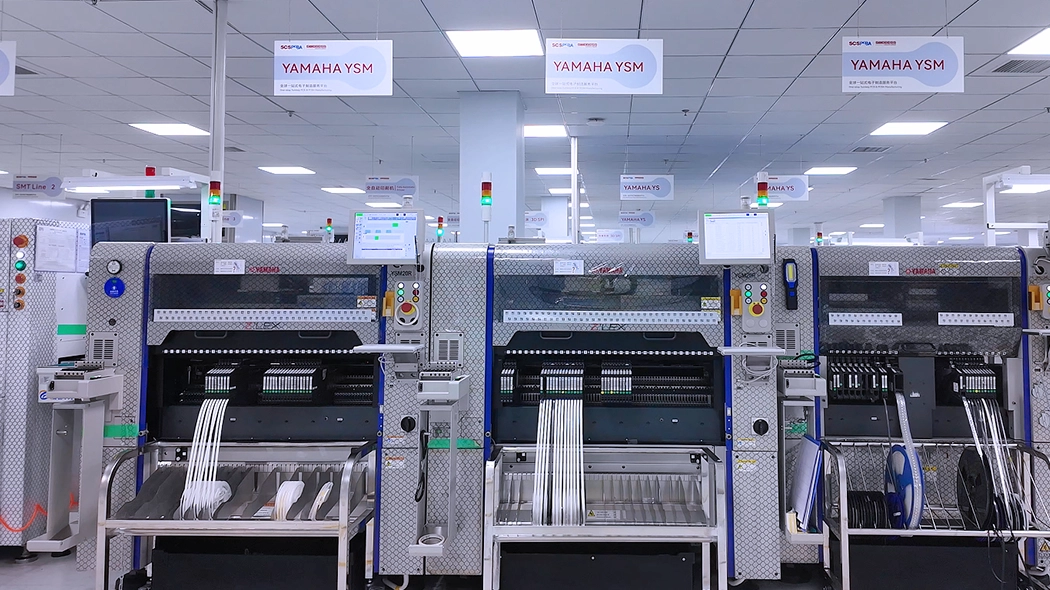
3. Global Supply Chain and Manufacturing Layout
As electronic component markets become increasingly volatile, global supply chain resilience is now a strategic priority.
Trends Shaping the Global Landscape
- Multi-Regional Manufacturing Networks: Companies are diversifying production with facilities in China, Vietnam, Eastern Europe, and North America, minimizing logistics risks.
- Localized Component Sourcing: Regional procurement hubs shorten lead times and improve flexibility.
- Digital Supply Chain Management: Cloud-based SCM platforms enable real-time monitoring of component inventory, shipment tracking, and supplier performance.
SCSPCBA’s Global Layout
SCSPCBA exemplifies this global strategy with four intelligent factories—in Shenzhen, Jiangxi, Jiangsu, and Vietnam—offering circuit board manufacturing and printed circuit board assembly manufacturing services, from PCB design to box build assembly.
By leveraging AI data analytics and integrated supply chain platforms, SCSPCBA ensures stable delivery, consistent quality, and global competitiveness.
4. SCSPCBA’s Smart Manufacturing and AI System Development
SCSPCBA has built a fully digitalized ecosystem that integrates smart quotation, automated production, and end-to-end quality control. Beyond its cutting-edge smart quotation platform, SCSPCBA continues to lead the printed circuit board production market through a series of innovations that bridge technology and manufacturing excellence.
Key Innovations Include:
(1) Advanced Production and Manufacturing Capabilities
- SCSPCBA operates four state-of-the-art intelligent factories across China and Vietnam, equipped with fully automated SMT lines, high-speed placement machines, AOI inspection, and functional testing systems.
- These facilities enable precise process control, stable quality output, and scalable production for both small-batch prototypes and high-volume manufacturing.
(2) Experienced Engineering Team
- Our engineering team has decades of collective experience in PCB layout, DFM optimization, and component engineering.
- Provide circuit board design consulting, helping clients refine schematics, reduce manufacturing complexity, and accelerate product iteration.
- Through rapid PCB prototyping and simulation-based verification, SCSPCBA enables faster upgrades and cost-effective design adjustments, giving customers a competitive edge in time-to-market.
(3) Certified Quality Management System
- Quality is embedded in every layer of SCSPCBA’s operations.
- The company is certified to ISO 9001 (Quality Management), ISO 14001 (Environmental Management), and IATF 16949 (Automotive Quality Management).
- These international certifications validate our strict adherence to traceability, process consistency, and continuous improvement.
Each PCBA undergoes rigorous inspection—including ICT, FCT, X-ray, and AOI tests—to guarantee full compliance with global standards.
(4) Fast Delivery and Global Logistics Network
- Offer rapid turnaround without compromising quality.
- One-stop logistics service covers secure packaging, customs handling, and international shipping, ensuring smooth and reliable delivery to customers worldwide.
(5) Comprehensive After-Sales and Technical Support
Beyond production, SCSPCBA offers ongoing technical support, troubleshooting, and maintenance guidance.
Our after-sales team provides prompt responses to engineering inquiries, ensuring product performance remains stable after delivery.
Whether it’s a firmware update, design adjustment, or testing consultation, SCSPCBA supports customers through every product lifecycle stage.
(6) Multi-Industry Application Expertise
- SCSPCBA’s solutions serve diverse industries including industrial control, medical devices, automotive electronics, IoT, and smart home systems.
- Our engineers are proficient in high-frequency, high-density, and high-reliability PCB designs, making SCSPCBA a trusted partner for mission-critical and safety-sensitive applications.
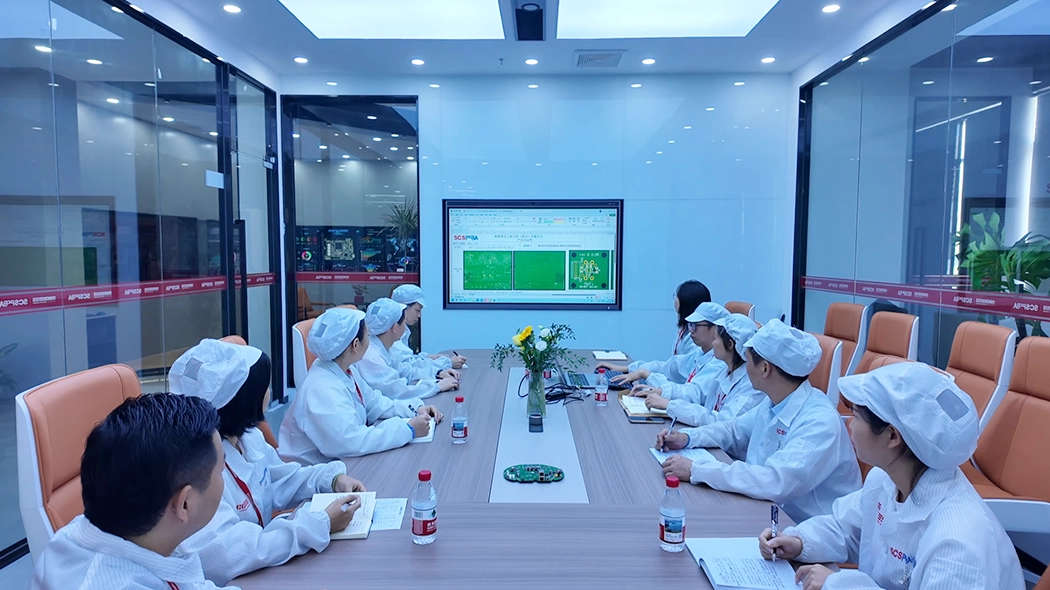
(7) OEM/ODM Customization Services
- We provide flexible OEM and ODM solutions tailored to brand-specific requirements.
- From concept to mass production, our cross-functional teams handle hardware design, firmware development, and mechanical assembly, helping partners shorten R&D cycles while maintaining product differentiation.
(8) One-Stop PCBA Manufacturing Services
- SCSPCBA offers a complete one-stop PCBA solution—from 24-hour component quotation to PCB fabrication, component sourcing, SMT assembly, box build, and functional testing.
- Our service supports low-to-medium volume production, allowing customers to efficiently scale from prototype to full-scale manufacturing.
- By integrating PCB soldering, filling, and inspection within a unified digital workflow, SCSPCBA guarantees seamless process coordination and faster delivery times.
5. Outlook: Sustainability and Green Manufacturing in PCBA Industry
Environmental sustainability has become a top priority for modern electronics manufacturing. The environmental footprint of PCB and PCBA production is under increasing scrutiny. The shift to green manufacturing is no longer a nice-to-have option but a necessary evolution for long-term competitiveness and regulatory compliance.
1. Material Innovation: Low-Carbon Substrates and Environmentally Friendly Processes
- Bio-based Epoxy Resins: Replacing petroleum-based resins with plant-based raw materials (such as castor oil) reduces carbon emissions.
- Recycled Copper Foil: Processing recycled copper can reduce the carbon footprint by 65%, and combined with tin-free plating processes (such as nickel-gold deposition), it avoids heavy metal contamination.
- Graphene Conductive Technology: Replacing metal conductors in specific applications reduces resource consumption.
- Reduced Emissions: Advanced wastewater recycling systems and energy-efficient reflow ovens further reduce emissions and resource consumption.
2. System-Level Green Solutions
- Green Manufacturing Model: AI-powered material waste tracking, covering the entire design, production, and recycling process, enables precise process control, optimizes energy utilization, and reduces scrap rates through predictive analytics, achieving optimal resource utilization and minimal environmental impact.
- Production Ecosystem: Global standards such as ISO 14001 and RoHS/REACH compliance are prompting companies to rethink their production ecosystems. Digital traceability and intelligent quality systems are being implemented to monitor the environmental performance of their global supply chains.
Sustainability is no longer a compliance requirement; it is now a core driver of brand value and customer trust.

